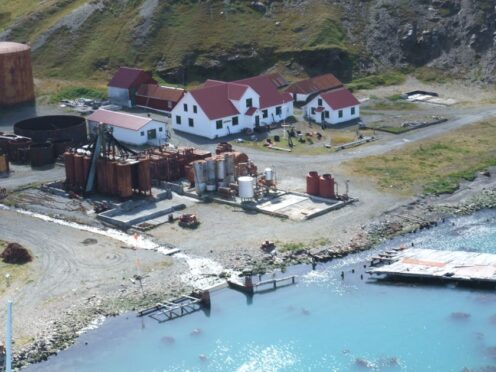Archivists are creating a “digital time capsule” to tell the story of Scots involved in whaling and are inviting contributions from those who worked in the industry.
The Whalers’ Memory Bank project has been launched to compile photographs and oral testimonies from those who worked in the industry, which provided a lifeline to Shetland during the post-war years.
The project has been created by the South Georgia Heritage Trust and the South Georgia Museum on the sub-Antarctic island, at the site of the former whaling station at Grytviken, to preserve a forgotten part of social history, including language and the experiences of wives left behind.
As many as 400 men worked aboard whaling ships, which sailed from October until May, starting in 1904 and ending in the mid-1960s.
Oil produced by the industry was used for margarine and cosmetics during the Second World War, and another by-product was animal feed.

As much as 50 tonnes of oil could be produced from 30% of a whale’s body weight, and other nations competing for the lucrative catch included Russia and Japan.
Gibbie Fraser, 82, chairman of Shetland Ex-Whalers Association, has contributed to the memory bank.
He worked on whaling ships for four seasons, starting as a 16-year-old in 1958, and said it was an “adventure” at a time when there was little opportunity for young men on Shetland.
Mr Fraser said: “I think we’d all like to go back and shoot them with a camera. Humpback whales produced a lot of oil, they were extremely docile and easily caught. We had four days to get them.
“Where I grew up, nothing had changed since the 1930s, you had to go to Aberdeen to see a double-decker bus. It was a great eye-opener on the ship, workers came from all over the country. I think they were all your friend really. There was no work here, for boys in particular. You were away seven months.

“It gave you more independence. Shetland was neglected by Britain. I enjoyed my time… I have got fond memories of great comradery. We have a meet-up in a hall in Shetland with old colleagues.”
He lost his job in 1963 and after the industry folded, Mr Fraser drove trucks and got his own fishing boat.
Workshops are being held in Scotland for people to contribute to the memory bank.
On Saturday, one takes place at the Scottish Maritime Museum in Irvine, North Ayrshire, from 10.30am until noon, and another is being held at the Scottish Fisheries Museum in Anstruther, Fife, from 11am until 12.30pm on Sunday.
The memory bank project received a grant of £170,000 from the National Lottery Heritage Fund and is led by Helen Balfour, whose ancestors were involved in whaling.
She said: “Very often you read about statistics, but there’s a human element to it. It was a really lucrative market especially in the war years in Britain, it was a really important product.
“Most of the margarine in World War II was made from whale oil. It was used for human consumption and for cosmetics. It was used for so many different things.
“In the end it just wasn’t economical as they had to go so far away to try to catch whales.”
